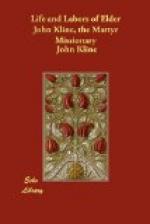But to be faithful to my calling, friends, I must repeat the last part of my text, if nothing more. Hear it, take the warning of its terrific words, for it is God’s warning and not mine. Here it is: “Woe unto the wicked! it shall be ill with them, for the reward of their hands shall be given them.” These words should strike terror into the hearts of the ungodly. The word reward means recompense, and recompense means payment for work done or services performed. But, according to all just laws, the one in whose service we labor is the one to whom we have a just right to look for our pay. Now I ask you to tell me whom you serve. Can you say in your heart, “I am serving the Lord”? If not the Lord, whom do you serve? Satan, the Devil, the old Serpent, the world and the flesh. These are what you serve, and these are the one—for all together make but one—to whom you are to look for your reward. And let me tell you from love in my heart for your soul, that your life in the service of the devil is a life of sin, and the reward or wages of sin is death; not extinction, but a state of deadness to all blessedness and happiness forever. But you say, “I cannot bear such a thought.” Neither can I. Come then with us, as the prophet says, and we will do you good. Turn from sin and seek the Lord. Serve him, and your reward will be glory, honor, immortality and eternal life.
FRIDAY, February 28. Father Wampler died at eleven o’clock to-day.
SUNDAY, March 2. Father Wampler was buried to-day. His age was seventy-six years, five months and seventeen days. He was the father of Anna Kline, my beloved wife, and of Samuel Wampler, one of our ministers. He was the grandfather of a very numerous line of grandchildren, among whom are many excellent members of the Brethren church.
SATURDAY, March 8. Samuel Wampler and I go to Page County. We have night meeting at Isaac Spitler’s. I speak from John 1:16. Text: “And of his fulness have all we received.”
The Apostle John made his record of the Gospel sometime after the other evangelists had written theirs. This fact accounts for the many things given by John which are omitted by the others. He wrote it long after the day of Pentecost, and after he had seen the church established in Judea, and in the regions of Asia under the ministries of Paul, and Silas, and Barnabas, and Peter, and others. He saw a tendency in the churches even in his day to depart from God’s ordinances; and led by the Divine Spirit he felt it his duty to set these forth in their simplicity and plainness, as he had seen them instituted and exemplified in his own personal presence by the Lord himself.




